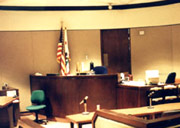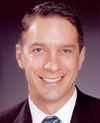|
|
|
Judge Suing Dry Cleaner Cries Over Pants
Court Watch |
2007/06/14 09:38
|
A judge had to leave the courtroom with tears running down his face Tuesday after recalling the lost pair of trousers that led to his $54 million lawsuit against a dry cleaner. Administrative law judge Roy L. Pearson had argued earlier in his opening statement that he is acting in the interest of all city residents against poor business practices. Defense attorneys called his claim "outlandish." He originally sued Custom Cleaners for about $65 million under the District of Columbia consumer protection act and almost $2 million in common law claims. He is no longer seeking damages related to the pants, instead focusing his claims on two signs in the shop that have since been removed.
He alleges that Jin Chung, Soo Chung and Ki Chung, owners of the mom-and-pop business, committed fraud and misled consumers with signs that claimed "Satisfaction Guaranteed" and "Same Day Service."
Pearson, representing himself, said in opening that he wanted to examine the culture that allowed "a group of defendants to engage in bad business practices for five years."
An attorney for the Chungs portrayed Pearson as a bitter man with financial troubles stemming from a recent divorce who is taking out his anger on a hardworking family.
"This case is very simple. It's about one sign and the plaintiff's outlandish interpretation," attorney Chris Manning said.
The Chungs were to present their case Wednesday. Manning asked D.C. Superior Court Judge Judith Bartnoff to award them reimbursement for their legal costs if they win.
Pearson called several witnesses Tuesday who testified that they stopped going to Custom Cleaners after problems with misplaced clothes.Pearson also called himself as a witness, saying his problems began in May 2005 when he brought in several suits for alterations. A pair of pants from a blue and maroon suit was missing when he requested it two days later. He said Soo Chung tried to give him a pair of charcoal gray pants.
As Pearson explained that those weren't the pants for the suit, he choked up and left the courtroom crying after asking Bartnoff for a break. Pearson originally asked the cleaners for the full price of the suit, which was more than $1,000. But because the Chungs insisted the pants had been found, they refused to pay.
Manning has said the cleaners made three settlement offers to Pearson, but the judge was not satisfied and increased his demands — including asking for money to rent a car so he could drive to another business. |
|
|
|
|
|
|
Colgate warns of fake toothpaste, maybe toxic
Business |
2007/06/14 09:32
|
Colgate-Palmolive (CL) said Thursday that counterfeit "Colgate" toothpaste that may contain a toxic chemical has been found in discount stores in four states.
"There are indications that this product does not contain fluoride and may contain diethylene glycol," the company said. Colgate-Palmolive said it does not use, nor has ever used, diethylene glycol as an ingredient in its toothpaste anywhere in the world. The chemical, known as DEG and sometimes illegally used as an inexpensive sweetener and thickening agent, is commonly used in solvents and antifreeze.The Colgate-Palmolive announcement comes less than two weeks after the U.S. Food and Drug Administration (FDA) warned consumers to avoid any toothpaste made in China after inspectors found DEG in tubes sold at two stores. Colgate-Palmolive said the counterfeit toothpaste was found in New York, New Jersey, Pennsylvania and Maryland. It can be recognized because it is labeled as being manufactured in South Africa, and the company does not import toothpaste to the United States from South Africa.
The packaging also contains several misspellings, Colgate said. It said it is working with the FDA to help to identify those responsible for the counterfeit product. DEG-contaminated toothpaste has also been seized in Costa Rica, the Dominican Republic, Panama and Nicaragua. It was also found in cough syrup in Panama that led to the deaths of at least 100 people last year. The FDA issued its alert about Chinese toothpaste after seizing a batch of Cooldent found to contain 3% DEG. Inspectors found the toothpaste at a Dollar Plus store in Miami and at a store called Todo a Peso in Puerto Rico. Brands seized earlier included Cooldent, Clean Rite and Oralmax that are usually found at discount retailers, the agency said. The FDA identified products by Goldcredit International Enterprises, Goldcredit International Trading Co. and Suzhou City Jinmao Daily Chemicals Co as containing DEG. Goldcredit International Enterprises is a unit of JiangsuXingda Stationery Group, a manufacturer of glue and office supplies. Suzhou City Jinmao Daily Chemicals also makes soap and pet products.
|
|
|
|
|
|
|
Top court allows lawsuits on U.N. property taxes
Law Center |
2007/06/14 07:40
|
| The U.S. Supreme Court ruled on Thursday that foreign governments can be sued in an effort to collect unpaid local property taxes on residences for their diplomats at the United Nations. The high court, by a 7-2 vote, sided with New York City and ruled the foreign governments are not shielded from such lawsuits on sovereign immunity grounds. The case involved the city's efforts to collect $16.4 million in unpaid property taxes and interest from India and $2.1 million from Mongolia for their missions at the United Nations. Under New York law, foreign governments have tax exemptions for the diplomatic mission section of their properties used exclusively for diplomatic offices and for the quarters of certain diplomats. But the city says the government must pay taxes for the space that houses lower-level employees. The two governments refused to pay the taxes and the city sued. The foreign governments sought to dismiss the lawsuits. Justice Clarence Thomas concluded in the court's majority opinion that the two foreign governments are not immune from the lawsuits under a 1976 federal law, a decision that allows the cases to go forward. Justices John Paul Stevens and Stephen Breyer dissented. "If Congress had intended the statute to waive sovereign immunity in tax litigation, I think it would have said so," Stevens wrote. |
|
|
|
|
|
|
UC Appeals Enron Bank Case to Supreme Court
Breaking Legal News |
2007/06/14 07:39
|
| The University of California has asked the U.S. Supreme Court to hear an appeal to overturn a decision that banks could not be held responsible for losses incurred during the Enron Corporation scandal. The university is the lead plaintiff in the class-action lawsuit involving 50,000 plaintiffs, originally filed in 2001 against a number of banks; only three banks remain defendents at this point, said UC spokesperson Trey Davis. The three banks involved are Merrill Lynch, Barclays and Credit Suisse First Boston. In April, the university filed a petition along with the other plaintiffs asking that the U.S. Supreme Court hear the appeal. On Monday, the university filed a brief asking that the court hear the appeal at the same time as another case that also grappled with the degree of responsibility for secondary actors like the banks. Enron Corporation was found to have committed investor fraud in 2001 and then collapsed. The university alleges that banks knew of the fraud and should now be held responsible for their role in Enron’s investor fraud. The total alleged loss for all plaintiffs involved is estimated at $40 billion, Davis said. According to Davis, the university lost approximately $145 million in investments as a result of the fraud and collapse. The 50,000 plaintiffs include both individual and institutional investors, although Davis said the university was one of the pension funds with substantial losses. The case had been heard in March by the U.S. Court of Appeals for the Fifth Circuit; that court ruled in favor of the banks in a 2-1 vote. The idea of holding banks responsible for their part in the Enron scandal would bring into question the concept of scheme liability. Scheme liability envisions fraudulent practices involving additional parties who actively and knowingly participate in the fraud, Davis said. “We’re alleging that banks knew what they were doing and did what they did to perpetuate the fraud,” Davis said. “Scheme liability means banks were part of the scheme as opposed to just being innocent bystanders.” While three banks currently remain as defendents, Davis said a number of other banks that had been involved in the case have settled for a total of approximately $7 billion out of court. If the Supreme Court decides in the university’s favor, Davis said the remaining three banks could have the option to settle out of court as well. Davis said he did not know when the Supreme Court is expected to respond or what the next steps will be for the case, adding that the university hopes the plaintiffs will get the chance to go to trial. |
|
|
|
|
|
|
Court rules Ohio man in murder case missed deadline
Legal Business |
2007/06/14 06:41
|
The Supreme Court dismissed an appeal of a convicted murderer from Ohio Thursday because he filed it two days late, even though he met a separate deadline set by a judge. The judge mistakenly told the prisoner, Keith Bowles, 34, that he could file court papers by Feb. 27, 2004. Under federal rules, however, the deadline was Feb. 24. Bowles filed on Feb. 26. The high court typically adheres strictly to deadlines and this case was no exception. The 5-4 decision, the 16th this term, fell along conservative-liberal lines and also provoked a strong dissent from Justice David Souter. Writing the opinion for the court's majority in this case, Justice Clarence Thomas said the judge's error did not alter the 14-day time limit set in federal law and legal rules. He said Congress could relax the deadline if it wishes. Bowles was convicted of murder in Ohio for his role in a group beating of an unarmed man, who later died. The beating was in revenge for an earlier beating that day to a relative of a member of the group in Painesville, about 30 miles northeast of Cleveland, court records showed. Bowles was given 15 years to life in prison. Early in 2004, a federal judge gave Bowles additional time to tell the court he intended to appeal, mistakenly noting a 17-day deadline. The 6th U.S. Circuit Court of Appeals said Bowles' appeal was untimely. Souter said Bowles' case cries out for an exception to the rule. "It is intolerable for the judicial system to treat people this way, and there is not even a technical justification for condoning this bait and switch," Souter said. Chief Justice John Roberts and Justices Samuel Alito, Anthony Kennedy and Antonin Scalia joined Thomas' opinion. Justices Stephen Breyer, Ruth Bader Ginsburg and John Paul Stevens joined Souter in dissent. |
|
|
|
|
|
|
Cabot Settles Class Action Lawsuits
Class Action |
2007/06/14 05:45
|
Specialty chemicals maker Cabot Corp. said Wednesday it agreed to settle the federal class action lawsuits pending against it that alleged it and other carbon black manufacturers violated antitrust laws in setting prices for carbon black sold in the United States. In a filing with the Securities and Exchange Commission, Cabot said its share of the settlement cost is $10 million. Cabot also denied any wrongdoing of any kind, and said it "strongly believes that it has good defenses to these claims." The company said it agreed to the settlement to avoid further expense, inconvenience, risk and the distraction of protracted litigation. The settlement agreement is subject to court approval. Boston-based Cabot said it will continue to defend the remaining antitrust lawsuits pending against it. There are suits pending in several state courts brought by purported classes of purchasers of carbon black, and a single federal case brought by a party that did not join the federal class action.
|
|
|
|
|
|
|
Gregory V. Pajak has joined The Barnes Firm
Legal Careers News |
2007/06/14 04:49
|
| Gregory V. Pajak, Esq. has joined The Barnes Firm as a partner. He will focus his practice on representing victims of personal injury concentrating on handling appeals and insurance coverage matters. Mr. Pajak received his JD from the State University at Buffalo, School of Law in 1992 along with a BA in 1989 (magna cum laude/phi beta kappa). Previously, Mr. Pajak was a partner with the firm of Chelus, Herdzik, Speyer, Monte & Pajak and for over 15 years represented insurance companies and defendants in personal injury lawsuits. Mr. Pajak has argued over 50 appeals before the Appellate Division, Fourth Department and has extensive civil trial experience. He is a frequent lecturer on insurance coverage topics including coverage disputes, contractual indemnity, bad faith and declaratory judgment matters along with personal and commercial liability law dealing with issues such as automobile, Labor Law, premises and products liability. Mr. Pajak authored Not for the Faint of Heart, Additional Personal Injury Protection (APIP) Benefits, published in the New York State Bar Association, JOURNAL, March/April 2006. He is a member of the Erie County and New York State Bar Association, the Women’s Bar Association of Erie County and the Buffalo Claims Association. He is a past Treasurer of the Western New York Trial Lawyers Association and was the President-elect of the Defense Trial Lawyers Association of Western New York.
About The Barnes Firm The Barnes Firm is a nationally recognized personal injury law firm, with headquarters in Buffalo, New York. The Barnes Firm focuses on auto accident, medical malpractice, premises liability and product defect cases. In 2006 alone, The Barnes Firm obtained settlements and verdicts in excess of $100,000,000 for their clients. For more information about The Barnes Firm visit www.TheBarnesFirm.com or contact us 1-800-483-2050.
|
|
|
|
|
|
|
Class action or a representative action is a form of lawsuit in which a large group of people collectively bring a claim to court and/or in which a class of defendants is being sued. This form of collective lawsuit originated in the United States and is still predominantly a U.S. phenomenon, at least the U.S. variant of it. In the United States federal courts, class actions are governed by Federal Rules of Civil Procedure Rule. Since 1938, many states have adopted rules similar to the FRCP. However, some states like California have civil procedure systems which deviate significantly from the federal rules; the California Codes provide for four separate types of class actions. As a result, there are two separate treatises devoted solely to the complex topic of California class actions. Some states, such as Virginia, do not provide for any class actions, while others, such as New York, limit the types of claims that may be brought as class actions. They can construct your law firm a brand new website and help you redesign your existing law firm site to secure your place in the internet. |
Law Firm Directory
|
|









